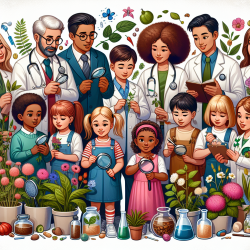Introduction
In the realm of child development, speech-language pathologists play a pivotal role in fostering communication skills. With the increasing interest in functional foods and beverages containing botanicals, practitioners have a unique opportunity to leverage these insights to enhance therapeutic outcomes. The recent study titled "Trends and Current Food Safety Regulations and Policies for Functional Foods and Beverages Containing Botanicals" provides valuable data that can guide practitioners in integrating these natural ingredients into their practice while ensuring safety and efficacy.
Understanding the Potential of Botanicals
Botanicals are rich in bioactive compounds that offer numerous health benefits. These compounds, derived from plants, have been shown to support various physiological functions. For speech-language pathologists, understanding the potential of botanicals can open new avenues for supporting children's cognitive and communicative development. For instance, certain botanicals are known for their neuroprotective properties, which could be beneficial in enhancing cognitive functions crucial for language acquisition.
Safety First: Navigating Regulations
While the benefits of botanicals are promising, it's crucial to navigate the complex landscape of safety regulations. The study highlights that countries with comprehensive national food control systems not only foster economic growth in the functional food sector but also build consumer trust. For practitioners, this means staying informed about the latest regulations and ensuring that any botanical supplements or functional foods recommended are compliant with safety standards.
Practical Applications in Therapy
Integrating botanicals into therapeutic practices requires a data-driven approach. Practitioners can consider the following steps:
- Research and Education: Stay updated on the latest research regarding botanicals and their effects on child development.
- Collaboration: Work with nutritionists and healthcare providers to develop safe and effective dietary plans that include botanicals.
- Monitoring and Evaluation: Regularly assess the impact of botanical interventions on children's progress and adjust strategies as needed.
Encouraging Further Research
The study underscores the need for more scientific data on the safety and efficacy of botanicals. Speech-language pathologists are encouraged to contribute to this growing body of research by documenting outcomes and sharing findings with the broader community. This collaborative effort can lead to more refined guidelines and enhance the overall understanding of how botanicals can support child development.
Conclusion
By embracing the insights from the latest research on botanicals, speech-language pathologists can enhance their practice and create better outcomes for children. However, it is imperative to prioritize safety and adhere to regulatory standards. As the field continues to evolve, practitioners have the opportunity to be at the forefront of integrating natural, evidence-based interventions into their therapeutic repertoire.
To read the original research paper, please follow this link: Trends and current food safety regulations and policies for functional foods and beverages containing botanicals.










